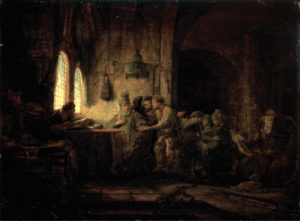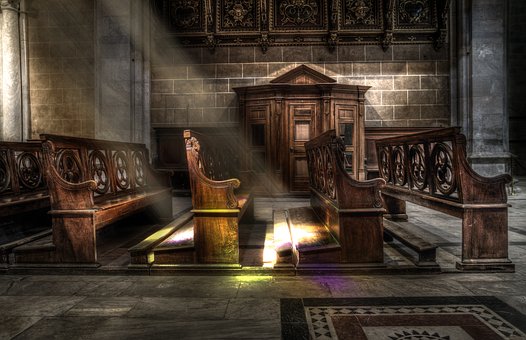The church of the Laodiceans is instructed to ‘anoint your eyes with eye salve’. It seems an unusual bit of advice. What does eyesight have to do with the church? On closer inspection of the Bible, it does not stand out as unusual; there are many references to sight or lack of from Genesis to Revelation.
This lukewarm church is frequently interpreted by theologians to be particularly relevant to the modern church.
What does it mean to Christians today? What visual defects do we suffer from and how is it important? A quick Biblical history of eyesight shows that it has not always been a blessing.
 Adam and Eve’s eyes were opened when they ate the fruit of the tree of the knowledge of good and evil. The first thing they see is their shameful nakedness; they hide from God and cover-up from each other. Adam no longer sings the praises of his wife ‘This, at last, is bone of my bones and flesh of my flesh’ and instead he tells God that Eve is to blame. What tragedy from the opening of our eyes!
Adam and Eve’s eyes were opened when they ate the fruit of the tree of the knowledge of good and evil. The first thing they see is their shameful nakedness; they hide from God and cover-up from each other. Adam no longer sings the praises of his wife ‘This, at last, is bone of my bones and flesh of my flesh’ and instead he tells God that Eve is to blame. What tragedy from the opening of our eyes!
The eye is the lamp of the body
In the gospels Jesus heals the blind; it is a key part of his Messianic ministry. He did, however, warn his disciples about the dangers of not seeing properly. “The eye is the lamp of the body. So, if your eye is healthy, your whole body will be full of light, but if your eye is bad, your whole body will be full of darkness. If then the light in you is darkness, how great is the darkness!” Has the church in its history ever suffered from an eye so bad that its whole body was full of darkness? It is a stern warning for good reason.
The Parable of the Workers in the Vineyard
The Parable of the Workers in the Vineyard further illustrates the problems of unhealthy eyes.
 When the workers who have toiled all day receive the same wages as the workers who have only worked for one hour complain, it is a problem of the eye. “Is it not lawful for me to do what I wish with my own things? Or is your eye evil because I am good?’. Instead of seeing their wages as a blessing and the mercy and goodness of the landowner, they choose to see injustice and inequality. The way the church sees the world is evidence of a healthy or unhealthy eye. This is not to say that we should declare everything good. However, we should not miss seeing the glory of God in our everyday life and the people around us.
When the workers who have toiled all day receive the same wages as the workers who have only worked for one hour complain, it is a problem of the eye. “Is it not lawful for me to do what I wish with my own things? Or is your eye evil because I am good?’. Instead of seeing their wages as a blessing and the mercy and goodness of the landowner, they choose to see injustice and inequality. The way the church sees the world is evidence of a healthy or unhealthy eye. This is not to say that we should declare everything good. However, we should not miss seeing the glory of God in our everyday life and the people around us.
In the teachings on healthy eyes, it is worth noting that money is often mentioned. In the above parable, the complaints are concerned with wages. The Laodiceans needing the eye salve also say, ‘I am rich, have become wealthy, and have need of nothing.’ Thirdly, Jesus’ teaching that the eye is the lamp of the body is sandwiched between two warnings on treasuring God more than earthly riches. “Do not lay up for yourselves treasures on earth” he begins and concludes his teaching on the eye with “No one can serve two masters; for either he will hate the one and love the other….. You cannot serve God and mammon.” It seems that to treasure God over personal wealth helps us to see better and maybe part of the eye salve solution.
So perhaps it would be wise to consider the health of the church with regards to sight. We should ask ourselves what we see and what the church sees. How healthy is our vision? If we sense that our eyesight is failing us, could we ask for the eye salve that David requested? “Open my eyes, that I may see Wondrous things from Your law.” Or we may simply need to look upwards a bit more often?






